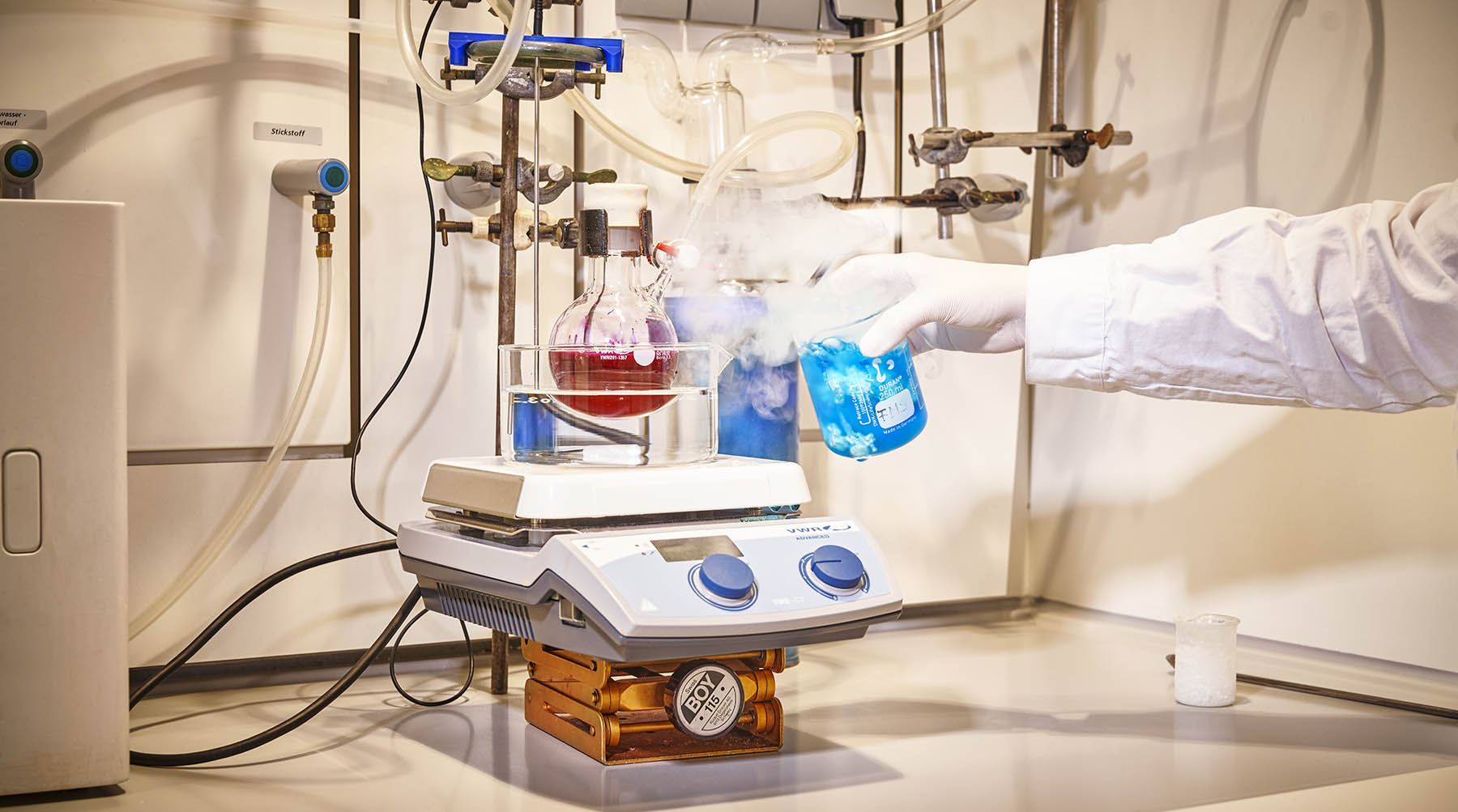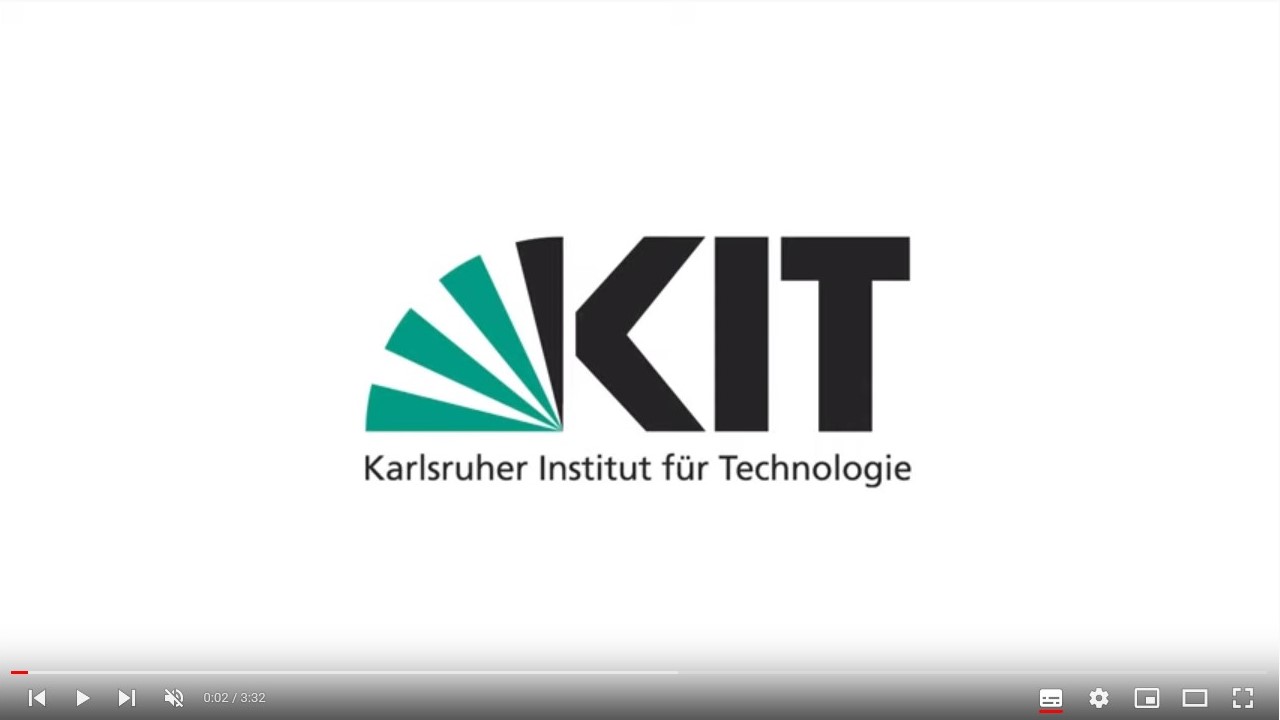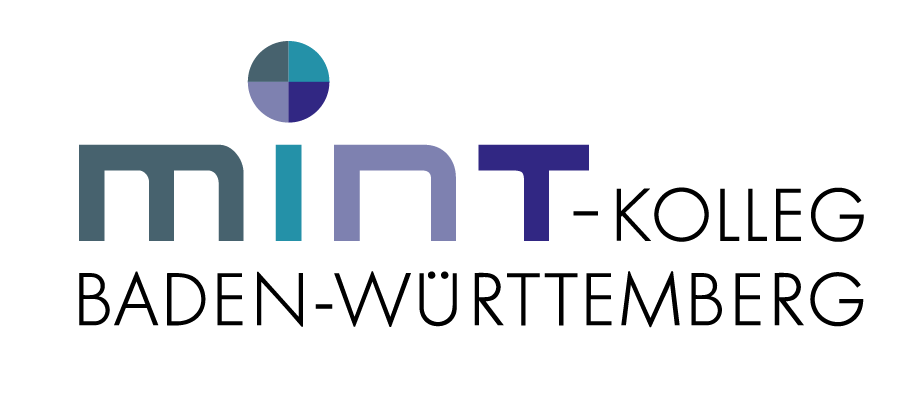Degree: Bachelor of Science (B.Sc.)
Regular program length: 6 semester (full-time program)
Credit points (ECTS): 180 credit points
Language of instruction: German
Higher semester: yes
Higher semester: winter and summer term
First semester: July 15
Higher semester: July 15 for winter term, January 15 for summer term
First semester: July 15
Higher semester: July 15 for winter term, January 15 for summer term
Studiengangsbeschreibung
Worum geht's?
Im Studiengang Chemische Biologie beschäftigst du dich mit der faszinierenden Welt der Moleküle und ihrer Rolle in lebenden Systemen. Du lernst, chemische, biologische und physikalische Methoden zu kombinieren, um komplexe biologische Prozesse auf molekularer Ebene zu verstehen. Dabei gewinnst du ein tiefes Verständnis für die Struktur und Funktion von Biomolekülen und erfährst, wie du diese gezielt untersuchen und beeinflussen kannst. Anders als in der Biochemie, die primär biochemische Stoffwechselprozesse untersucht, liegt der Schwerpunkt der Chemischen Biologie auf der gezielten chemischen Modifikation und Analyse biologischer Systeme. Du entwickelst Werkzeuge und Methoden, die neue Einblicke in die Biologie ermöglichen und Anwendungen in Medizin, Umweltforschung und Biotechnologie vorantreiben. Wenn du interdisziplinäres Denken liebst und Naturwissenschaften miteinander kombinieren möchtest, bist du hier genau richtig.
Program structure
During your studies, you have various subjects, which consist of one or more modules. A module deals with a specific topic and consists of one or more courses. In the module handbook for your degree program, you will find a description of the modules and their subject assignment as well as a study plan. This gives you an orientation as to which courses you should attend in which semester in order to complete your studies within the standard period of study. It takes into account a balanced distribution of courses over the individual semesters. It also ensures that you are first taught the important basics before moving on to more advanced topics. Your individual course of study may differ from this.
Im Studiengang Chemische Biologie hast du diese Fächer:
- Grundlagen der Fächer Anorganische, Organische, und Physikalische Chemie: In diesen Grundlagenfächern lernst du die Basis der chemischen Wissenschaften kennen. Du beschäftigst dich mit der Struktur und Reaktivität von Molekülen, den Gesetzmäßigkeiten chemischer Reaktionen und physikalisch-chemischen Phänomenen wie Thermodynamik und Kinetik.
- Grundlagen der Fächer Physik und Mathematik: Du lernst die mathematischen Werkzeuge wie lineare Algebra und Analysis kennen, die in Chemie und Physik essentiell sind. In der Physik befasst du dich mit Mechanik, Schwingungen, Wellen, Thermodynamik sowie Elektrizität, Magnetismus und Optik.
- Grundlagen der Biologie: Hier geht es um die chemischen und biologischen Grundlagen des Lebens, einschließlich DNA, RNA, Proteinen, Zellbiologie, Genetik und Evolution. Du erfährst, wie Pflanzen und Tiere als Systeme funktionieren und biologische Phänomene erklärt werden. Die Mikrobiologie vermittelt dir die molekularen Grundlagen und den Einfluss auf Gene und deren Expression.
- Vertiefung Organische Chemie: Du vertiefst dein Wissen in moderner Synthesechemie mit Schwerpunkten wie Carbonyl-Chemie, metallorganischer Chemie und stereoselektiven Synthesen. Themen wie Syntheseplanung, selektive Reagenzien, Oxidations-Reduktionsmethoden, Baldwin-Regeln, Peptid-Chemie und analytische Methoden zur Molekülstruktur ergänzen die Inhalte.
- Vertiefung Biologie: Hier lernst du grundlegende Techniken der modernen Biologie wie Fluoreszenzmikroskopie, Westerblot und PCR, um Zellen, Proteine und DNA zu untersuchen, sowie den Umgang mit Gen-Datenbanken
- Grundlagen der Fächer Biochemie, Bioanalytik und Chemische Biologie: Hier lernst du, biologische Moleküle mit Methoden wie Proteinanalyse und Nukleinsäurebestimmung zu untersuchen. Dazu erwirbst du Kenntnisse in Zellkultur, Enzymkinetik, Synthese biologisch aktiver Moleküle und der Manipulation biologischer Prozesse mit chemischen Methoden. Zudem lernst du, wissenschaftliche Experimente korrekt durchzuführen und auszuwerten.
- Chemisch-Biologische Forschung: In diesem Modul bereitest du dich auf deine Bachelorarbeit vor. Du wählst ein Thema aus, das du in einem fünf-wöchigen Praktikum bearbeitest. Dabei vertiefst du deine Kenntnisse in chemisch-biologischen Methoden, übst experimentelles Design und problemorientiertes Denken.
- Überfachliche Qualifikationen: In den Modulen Rechtskunde, Toxikologie, Informationstechnologie und Wissenschaftliches Schreiben lernst du, Informationstechnologie gezielt für wissenschaftliches Arbeiten zu nutzen, erwirbst rechtliche Kenntnisse zum sicheren Laborbetrieb und Umgang mit Gefahrstoffen, erhältst Einblick in toxikologische Wirkungen und erlernst die Grundlagen des wissenschaftlichen Schreibens, einschließlich korrektem Zitieren und Erstellen von Abbildungen.
Im Bachelorstudiengang Chemische Biologie am KIT startest du mit einem breiten naturwissenschaftlichen Grundlagenstudium. Diese solide Basis bereitet dich auf die folgenden Studienabschnitte vor. Zu Beginn liegt der Fokus auf grundlegenden Laborarbeiten, bei denen du wichtige Techniken der wissenschaftlichen Arbeit erlernst.
Im weiteren Verlauf des Studiums baust du diese Grundlagen aus, indem du dich zunehmend mit der Kombination der verschiedenen Disziplinen beschäftigst. Du lernst, moderne Methoden der chemischen Biologie anzuwenden und vertiefst dein Wissen in den einzelnen Fachbereichen. Gegen Ende des Studiums liegt der Schwerpunkt auf der Anwendung dieser Methoden in Forschungsprojekten. Du wirst darauf vorbereitet, wissenschaftliche Arbeiten selbstständig durchzuführen und weiterführende Forschung zu betreiben.
Ein besonderes Merkmal des Studiums ist der hohe Anteil an Laborpraktika, die dir wertvolle praktische Erfahrungen vermitteln. Zusätzlich erwirbst du überfachliche Qualifikationen, die dich optimal auf deine zukünftige Karriere in der Forschung, Industrie oder anderen naturwissenschaftlichen Bereichen vorbereiten.
Stays abroad
KIT offers a wide range of options for stays abroad, from individual courses to a year abroad. Especially if you are interested in a longer stay abroad, it is advisable to contact the International Students Office early on.
Bachelorarbeit
Am Ende deines Bachelorstudiums fertigst du deine Bachelorarbeit an, eine wissenschaftliche Arbeit, die es dir ermöglicht, dein erlangtes Wissen und deine Fähigkeiten anzuwenden und zu vertiefen. Normalerweise behandelt sie ein spezifisches Thema in deinem Studienfach und erfordert eigenständige Forschung, Analyse und das Verfassen einer schriftlichen Ausarbeitung. Die maximale Bearbeitungsdauer der Bachelorarbeit beträgt drei Monate. Zur Bachelorarbeit gehört auch eine Präsentation deiner Ergebnisse.
Weitere Informationen
Außer dem Modulhandbuch ist unsere Studiengangbroschüre eine nützliche Informationsquelle. Sie behandelt auch Themen wie Bewerbungsverfahren, Studieneinstieg und Berufsperspektiven.
Qualification profile of the graduate
The Chemical Biology Bachelor's program is characterized by its interdisciplinary orientation, which is reflected in a wide range of qualifications. This consistently prepares students for later work across scientific boundaries. Topics of study include molecular evolution, enzymatic specificity and catalysis, medical mechanisms of action, molecular communication and biosynthetic processes. The methodological training is predominantly based on the fields of biochemistry, molecular biology and biophysics.
Graduates of the Bachelor's program in chemical biology:
- have a basic knowledge of mathematics and physics and a sound knowledge of chemistry and biology. They are able to recognize and evaluate scientific tasks and problems in chemical biology and to formulate simple solutions.
- have mastered the basic scientific methods of their discipline and have learned to apply them according to the state of their knowledge to analyze recognized problems or technical issues. They know the most important theoretical concepts and experimental methods of chemical biology and are able to carry out analytical and experimental investigations, evaluate and interpret the data and draw conclusions.
- are able to work on the solution of (bio)chemical problems both independently and in teams, are able to record the results of others and are able to communicate their own and team results in writing and orally.
- have a basic understanding of core chemical and biological subjects (organic and physical chemistry, microbiology, genetics and molecular biology), have acquired initial knowledge of biochemistry and chemical biology, and are able to communicate and collaborate with specialists in related disciplines.
- have acquired in-depth knowledge and advanced practical working techniques in selected areas (organic and biophysical chemistry, biochemistry or biology).
- have worked on a completed research topic in a scientific environment under supervision.
- possess a basic understanding of practical applications of chemical compounds and materials and processes in various fields of work, are aware of limitations and hazards that arise, and can apply their knowledge responsibly and for the benefit of society, taking into account safety and ecological requirements. They can actively contribute to the opinion-forming process in society regarding scientific issues.
- have acquired exemplary non-specialist qualifications (IT competence in independent modules, ability to work in a team, language competence, lecture techniques integrated in specialist modules) and have thus gained initial impetus for the non-specialist requirements of a professional activity.
- are very well prepared for employment in different occupational fields or the acquisition of a higher qualification in their subject due to the basic orientation of the training.
Berufsperspektiven
Der Bachelorstudiengang Chemische Biologie bildet die Grundlage für einen Masterstudiengang in Chemischer Biologie und nah verwandten Disziplinen. Nach Abschluss des Masterstudiengangs wird in der Regel eine Promotion angestrebt.
Nach dem Studium der Chemischen Biologie bieten sich dir vielfältige Berufsmöglichkeiten zum Beispiel an Hochschulen und Forschungsinstituten, in Unternehmen der Pharma- und Chemieindustrie sowie in der Biotechnologie-Branche. Die dort wahrgenommenen Tätigkeitsfelder reichen von Forschung und Entwicklung, über Diagnostik, Analytik, Produktion und Vertrieb bis hin zu Marketing oder Beratung.
Besonderheiten des Studiengangs
-
ExperiMentoring-Programm zum Studienstart
-
Interdisziplinäre Ausrichtung
-
Kleiner Studiengang
-
einzigartige Möglichkeit universitäre Ausbildung mit der Forschung an Großforschungsanlagen zu verbinden
-
Einbindung in den Universitätsverbund EUCOR und der Europäischen Universität EPICUR ermöglicht Teilnahme an Lehrveranstaltungen der Universitäten Freiburg, Basel, Straßburg, Colmar und Mulhouse sowie Amsterdam, Poznan, Wien und Thessaloniki
-
Vorbereitungs- und Unterstützungskurse im MINT-Kolleg
-
Großes Angebot an Hochschulgruppen
-
Möglichkeit von Nebenjobs an wissenschaftlichen Instituten/Laboren
Admission requirements
Higher education entrance qualification (HZB)
Germans and persons of equal status to Germans (i.e. EU/EEA nationals and non-EU/EEA nationals with a German higher education entrance qualification) are entitled to study at KIT if they have one of the following qualifications:
- General higher education entrance qualification (Abitur)
- (relevant) subject-restricted higher education entrance qualification (not Fachhochschulreife)
- Delta examination of the University of Mannheim (for holders of a Fachhochschulreife)
- recognized advanced vocational training (e.g. master craftsperson) or vocational training, professional experience and aptitude test for those with professional qualifications
For further options, see §58 of the "Landeshochschulgesetz" (State Higher Education Act).
Please note: German nationals with a foreign school-leaving qualification must have the relevant "Regierungspräsidium" (regional authority) certify that their qualification is equivalent to the German Abitur.
For non-EU/EEA nationals with a foreign school-leaving certificate (hereinafter also referred to simply as non-EU/EEA nationals), the school-leaving certificate from some countries is recognized as a direct university entrance qualification in Germany. In many cases, however, in addition to the school-leaving certificate, a university entrance examination and/or a successful year of study in the home country and/or the "Feststellungsprüfung" must be proven with valid documents in order to be allowed to study a bachelor's degree in Germany. You can find the country-specific regulations in the DAAD admissions database or on the Anabin website (in German only) of the "Zentralstelle für ausländisches Bildungswesen" (Central Office for Foreign Education). Further information is available from the International Students Office.
Sprachvoraussetzungen und -nachweise
Für den Bachelorstudiengang Chemische Biologie benötigst du ausreichende Kenntnisse der deutschen Sprache, welche mindestens dem Niveau C1 des Gemeinsamen Europäischen Referenzrahmens für Sprachen (GER) entsprechen.
Proof of sufficient German language skills
Your higher education entrance qualification (HZB) is sufficient proof of your German language skills,
-
if you obtained it at a German-speaking school in Germany or abroad,
-
if you are a graduate of a bilingual secondary school in Germany or abroad and have passed a bilingual German examination, such as the AbiBac or the Gemischtsprachiges International Baccalaureat (GIB) or
-
if you graduated from a foreign school, but there is another official agreement with the respective country on the recognition of your school-leaving certificate or language certificate as proof of language proficiency for university studies in Germany.
A complete list of foreign school-leaving qualifications and language certificates that are recognized as proof of sufficient German language skills can be found on the website of the Kultusministerkonferenz (Standing Conference of the Ministers of Education and Cultural Affairs of the Länder in the Federal Republic of Germany).
If you did not obtain your higher education entrance qualification at a German-speaking institution, you must provide a separate language certificate - regardless of your nationality. Only the following are accepted
- the passed „Prüfungsteil Deutsch“ of the Feststellungsprüfung,
- the passed DSH with the overall result DSH-2,
- the passed TestDaF level 4 in all four parts of the exam (reading comprehension, listening comprehension, written expression, oral expression) or
- a comparable, recognized certificate of sufficient German language skills.
To find out which other recognized certificates can be accepted as comparable by KIT, please contact
- as a German or German-equivalent applicant: Studierendenservice
- as an applicant with non-EU citizenship: International Students Office
Please note:
Language certificates are extremely important application documents that can prevent your enrollment if you do not submit them on time. Therefore, check early on in the application process whether you have the necessary language certificates for your degree program and, if necessary, plan to take one of the language tests mentioned above. The deadline by which you must submit language certificates corresponds to the enrollment deadline stated in your admission offer. In justified cases, you can apply for an extension of this deadline. The extension can be granted until the start of the lecture period at the latest.
Additional necessary requirements for enrollment
For Germans and those with German equivalent status, an additional necessary requirement for enrollment is proof of participation in a study orientation test (e.g. www.was-studiere-ich.de) or a study orientation consultation in accordance with §7 of the "Landeshochschulgesetz" (State Higher Education Act), e.g. by the Student Advisory Service (ZSB) of KIT. Non-EU/EEA nationals do not have to provide this proof.
Auswahlverfahren
Auswahlverfahren für deutsche und Deutschen gleichgestellte Bewerberinnen und Bewerber
Es stehen 30 Studienplätze zur Verfügung. Nach Abzug der Vorabquoten für Härtefälle (5%), Ausländerinnen und Ausländer (10%) und Zweitstudienbewerberinnen und -bewerber (2%), werden 10% der Studienplätze an die Bewerberinnen und Bewerber mit der längsten Wartezeit vergeben. 90% der Studienplätze werden über ein Auswahlverfahren verteilt.
Das Auswahlverfahren basiert überwiegend auf den schulischen Leistungen der Bewerberinnen und Bewerber. Aufgrund dieser Leistungen und sogenannter sonstiger Leistungen wird eine Rangfolge nach Punkten gebildet.
Berechnung der Auswahlpunkte:
- Summe der Punkte im Abiturzeugnis durch 56 bzw. 60 geteilt
max. 15 Punkte
- arithmetisches Mittel (Summe aller Punkte geteilt durch die Anzahl der Kurse) der Oberstufenkurse:
- Mathematik
- Deutsch
- bestbenotete, fortgeführte (moderne) Fremdsprache
- bestbenotete Naturwissenschaft aus dem Bereich Biologie, Chemie oder Physik
max. 15 Punkte - sonstige Leistungen (abgeschlossene einschlägige Berufsausbildung, einschlägige Berufsausübung, besondere Vorbildungen, praktische Tätigkeiten, außerschulische Leistungen und Qualifikationen)
max. 15 Punkte
Wert 1 + (Wert 2) x 2 + Wert 3 = insgesamt max. 60 Punkte
Die Ergebnisse der Auswahlverfahren der vergangenen Jahre findest du in der Broschüre Zulassungsergebnisse.
Detailierte Informationen zum Auswahlverfahren findest du in der Satzung für das hochschuleigene Auswahlverfahren des Studiengangs.
Selection procedure for applicants from non-EU/EEA countries
Please note that a different selection procedure applies for third-country nationals (non-EU/EEA). This selection procedure is based on the higher education entrance qualification. The higher education entrance qualification can be based on academic achievements in school, any previous academic achievements at universities and/or the "Feststellungsprüfung".
Application portal
Application for the 1st semester
Application for a higher semester
Study preparation
Prepatory courses at KIT: The MINT-Kolleg offers prospective and first-year students support in natural science and technical subjects (STEM).
In addition, the KIT-Departments offer special preliminary courses before the start of the semester program during the "O-Phase" (orientation week).
Support during your start at KIT
The KIT offers support for all first-year students in order to have a successful start of their studies. Numerous orientation events and mentoring programs at the KIT-Departments help students to make friends, orientate themselves and find support where needed. The central online portalstudienstart.kit.edu is a first guide to all important offers, brings together all relevant information and contains helpful hints for a successful start of your studies:
- advisory centers
- mentoring programs
- info sessions
- workshops
- extensive online information
Contacts
Student advisor
Student advisory services (ZSB)


Karlsruher Institut für Technologie (KIT)
Zentrale Studienberatung (ZSB)
Engelbert-Arnold-Str. 2
76131 Karlsruhe
Karlsruher Institut für Technologie (KIT)
Studierendenservice
Kaiserstr. 12
76131 Karlsruhe
First point of contact for international applicants
Karlsruher Institut für Technologie (KIT)
International Students Office (IStO)
Adenauerring 2
76131 Karlsruhe
Printed matter
Module handbook
| Titel | Download |
|---|---|
| Module handbook Chemical Biology Bachelor | PDF (German) |
| Public view Chemical Biology Bachelor in the Campus Management System | Link (German) Link (English) |
Statutes and regulations
| Titel | Stand | Download |
|---|---|---|
| 2021 KIT 035 Satzung zur Änderung der Satzung für das hochschuleigene Auswahlverfahren im Bachelorstudiengang Chemische Biologie an der Universität Karlsruhe (TH) | 08.07.2021, veröffentlicht 12.07.2021 | |
| 33. Satzung für das hochschuleigene Auswahlverfahren im Bachelorstudiengang Chemische Biologie an der Universität Karlsruhe (TH) | 02.06.2009 |
| Titel | Stand | Download |
|---|---|---|
| 2014 KIT 019 Satzung zur Umsetzung des Übereinkommens über die Anerkennung von Qualifikationen im Hochschulbereich der Europäischen Region vom 11. April 1997 gemäß §§ 32 Abs. 2, 4 und 36a LHG in den Studien- und Prüfungsordnungen am KIT | 28.03.2014, veröffentlicht 28.03.2014 | |
| 2013 KIT 028 Satzung des Karlsruher Instituts für Technologie (KIT) über die Änderung der Prüfungsordnungen für die am MINT-Kolleg Baden-Württemberg beteiligten Bachelorstudiengänge | 12.08.2013, veröffentlicht 20.08.2013 | |
| 2011 KIT 002 Neubekanntmachung der Studien- und Prüfungsordnung des Karlsruher Instituts für Technologie (KIT) für den Bachelorstudiengang Chemische Biologie | 25.01.2011, veröffentlicht 17.02.2011 |
Teaching calendar
WT 2024/25
10-21-2024 to 02-15-2025
ST 2025
04-22-2025 to 08-02-2025
WT 2025/26
10-27-2025 to 02-21-2026
ST 2026
04-20-2026 to 08-01-2026
WT 2026/27
10-26-2026 to 02-20-2027
ST 2027
04-19-2027 to 07-31-2027
WT 2027/28
10-25-2027 to 02-19-2028
ST 2028
04-18-2028 to 07-29-2028
Lectures will not take place:
- From 12-24 to 01-06
- the week after Pentecost
- on all public holidays in the state of Baden-Wuerttemberg










